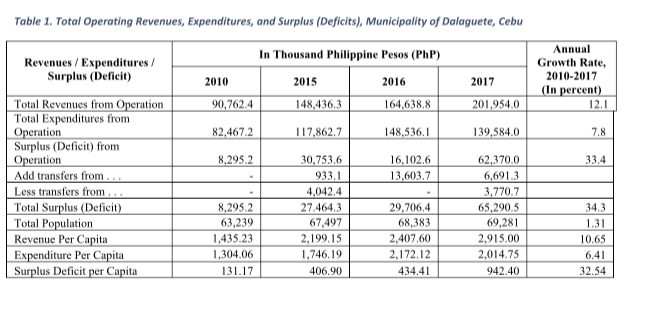Local government fiscal performance: the case of Dalaguete, Cebu
Fiscal prudence requires that government, whether local or national, is constraint to raising taxes, expenditures, deficits, debts, and other liabilities only within affordable and sustainable limits.
Fiscal prudence goes with the responsibility of the local government units (LGUs) to generate enough funds from local sources to add to their share of the Internal Revenue Allotment (IRA) given by the national government. This is necessary in order for them to have more resources to exercise the various functions devolved to them from the national government under the 1991 Local Government Code. This is also important in order reduce its reliance on IRA to meet the needs for basic services of their constituents.
Fiscal responsibility also means that revenues generated are applied in programs and projects that produce the greatest net benefits for the municipality as a whole with due consideration not only in making the LGUs more productive but also inclusive in the nature of their development.
Other than their share of the IRA, the LGUs get more income from collection of real estate taxes, local business taxes, service fees and other charges, enterprise operation, and from investments in financial and physical assets.
In the case of the Municipality of Dalaguete, its total revenue had grown more than twofold from P90.8 million in 2010 to P202.0 million in 2017. This is equivalent to growing at a fast clip of 12.1 percent annually in seven years.
On a per capita basis, the municipal revenue has grown 2.3 times in seven years from P1,435 per person in 2010 to P2,915 per person in 2017 or by 10.6 percent annually. More revenue per capita means more capacity on the part of the local government unit to provide services to its people.
In 2017, the IRA of Dalaguete amounted to P143.3 million. This was equivalent to 71.0 percent of its total revenues. This percentage is lower than the 74.8 percent average share of the IRA to their total revenues recorded for all 1,489 municipalities in the country in the same year. It was 74.3 percent in average for all 81 provinces and 40.0 percent for all 145 cities.
The lower the LGU’s percentage share of the IRA to their total revenue, the lower their dependence on the national government transfers for their operations. This is a good sign for the Municipality of Dalaguete because it means that it has a higher capability now than most other municipalities in the country to meet the need for services of their constituents.
Total expenditures of Dalaguete had grown 1.69 times from P82,6 million in 2010 to P139.6 million in 2017 or at an annual rate of 7.8 percent.
On a per capita basis, the municipal expenditure has grown 1.54 times in seven years from P1,304 per person in 2010 to P2,015 per person in 2017 or by 6.1 percent annually.
Higher per capita expenditures translate to more benefits delivered to the people.
A much lower rate of growth in expenditures than the growth in revenues implies that more surplus funds are going into the coffers of the municipal government. Starting from only P8.3 million in 2010, Dalaguete’s surplus per capita from its annual operation has increased 7.18 times in seven years to P62.3 million in 2017 or by 32.54 percent annually.
More operating surplus means that the LGU is now more capacitated to meet its non-current operating expenditures such as in making new investments or in paying its loans.
How have the rest of the municipalities in Cebu performed in the same period compared with Dalaguete?
Disclaimer: The comments uploaded on this site do not necessarily represent or reflect the views of management and owner of Cebudailynews. We reserve the right to exclude comments that we deem to be inconsistent with our editorial standards.


